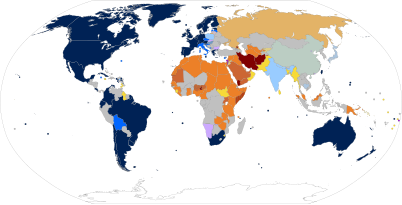Marriage equality

Rings indicate areas where local judges have granted marriage or imposed the death penalty in a country where that is not otherwise the law. 1May include recent laws or court decisions which have created legal recognition of same-sex relationships, but which have not yet come into force. 2Or unregistered cohabitation. |
Contents
Partnership registrations
In response for the growing call for some form of recognition of same-sex relationships, the then Mayor of London, Ken Livingstone introduced the London Partnership Register in 2001. This enabled same-sex couples to have a degree of recognition by an official body of their relationship, but had no legal force. It was open to opposite-sex as well as same-sex couples. Similar registers were set up in other places in the UK. The success of the London Partnership Register, and the lack of any public outcry against it, is thought to have paved the way for the introduction of civil partnerships.
Civil partnerships
Civil partnerships were introduced by the Labour Government under the Civil Partnership Act 2004. The first civil partnerships were formed in December 2005. Civil partnerships were essentially designed to parallel civil (as opposed to religious) marriage, hence the prohibition on holding a civil partnership ceremony on religious premises (this ban has since been removed) or on including any religious element in the ceremony.
One difference from civil marriage as that sex is not mentioned in the law. A marriage can be annulled if it's not consummated (ie if the couple don't have sex together) and one of the ground for divorce is adultery (ie if one of the couple has sex with someone else): there's no equivalent for either of these in the case of civil partnerships. As a result the Church of England, which officially disapproves its clergy having homosexual relationships, has not banned its priests from entering into civil partnerships, on the grounds that they can do so and still remain sexually celibate.
A number of other countries, starting with Denmark in 1989, have introduced the equivalent of civil partnership, often called civil union, domestic partnership, or registered partnership. Several of these countries have since introduced same-sex marriage: in some cases the registered partersnips have simply been converted into marriages, in other cases such as the Netherlands civil unions and same-sex marriage continue to exist side by side.
The demand for marriage equality
The Civil Partnership Act was welcomed as a major step forward for gay people, but there has been a growing view that it does not represent full equality.
On 15 March 2012 the Home Office launched a consultation about the introduction of equal marriage in England and Wales[1] Equalities Minister Lynne Featherstone said: “I believe that if a couple love each other and want to commit to a life together, they should have the option of a civil marriage, whatever their gender. Today is a hugely important step as we consider how to lift the ban on civil marriage for same-sex couples. This is about the underlying principles of family, society, and personal freedoms. Marriage is a celebration of love and should be open to everyone."[2]
For Scotland, The Scottish Government conducted a similar consultation exercise starting 2 September 2011.[3] The consultation has closed, but the results have not yet been announced. There are no plans for consultation in Northern Ireland.